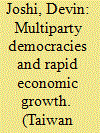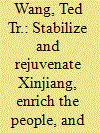|
|
|
Sort Order |
|
|
|
Items / Page
|
|
|
|
|
|
|
| Srl | Item |
| 1 |
ID:
125281


|
|
|
|
|
| Publication |
2013.
|
| Summary/Abstract |
Disasters are not only increasing in number, they are becoming more complex as natural and man-made crises combine to cause mega-disasters. Rapid urbanization, population growth, political unrest, and migration have created fragile environments in many countries, and boundaries are blurring between complex emergencies and chronic vulnerability in places such as the Democratic Republic of the Congo and Somalia. These factors have resulted in intense pressure on the UN's humanitarian organizations and partners to respond more quickly when disaster strikes and to be more effective in its response.
|
|
|
|
|
|
|
|
|
|
|
|
|
|
|
|
| 2 |
ID:
154434


|
|
|
|
|
| Summary/Abstract |
This paper addresses the question of whether the way bribery is practiced in China is such that corruption might be compatible with rapid economic growth during the boom years between 2000 and 2007. In particular, it examines whether bribery based on diffuse reciprocity transforms a corrupt relationship from one based on short-term egoistic gains (looting) to one based on long-term gains (profit maximizing), with the assumption that such a form of bribery will lead the parties to maximize total gains and hence will encourage long-term growth rather than short-term predatory looting. More broadly, the paper inquires whether a regime of informal property rights based on bribery and diffuse reciprocity might compensate for the shortcomings of an imperfectly constructed and incomplete set of formal property rights such as has emerged in post-Mao China and thereby improve the prospects for economic growth. The paper concludes that while bribery based on diffuse reciprocity may encourage the parties directly involved in such corrupt exchanges to maximize their total long-term gains, so long as bribery remains a private good and an informal property rights regime based on bribery remains subject to abrupt and catastrophic revision due to its illegal nature, “bribery with Chinese characteristics” cannot be characterized as growth enhancing and thus cannot be a major explanation for why the Chinese economy grew rapidly during the “third boom.”
|
|
|
|
|
|
|
|
|
|
|
|
|
|
|
|
| 3 |
ID:
107443


|
|
|
|
|
| Publication |
2011.
|
| Summary/Abstract |
This essay examines whether developing countries with competitive multiparty
democracies may be just as capable of sustaining rapid economic growth
as single-party states. It begins with a literature review identifying political
stability and the ability to mobilize labor and capital production inputs as key
factors behind sustained rapid growth. It then develops the hypothesis that under
certain conditions, multiparty democracies may be strong in these dimensions,
but ceteris paribus, single-party states are likely to have an advantage. I test
this hypothesis by exploring historical trends in rapid growth over the last five
decades. Statistical regression analysis confirms that most sustained highgrowth regimes have not been competitive multiparty democracies. On a more
optimistic note, however, the number of high-growth multiparty democracies
increased significantly during the period between 2000 and 2009, signaling a
possible breakthrough in the twenty-first century.
|
|
|
|
|
|
|
|
|
|
|
|
|
|
|
|
| 4 |
ID:
129265


|
|
|
|
|
| Publication |
2012.
|
| Summary/Abstract |
I have come to Xinjiang this time mainly to do some investigating and research for implementing the scientific concept of development, promoting economic and social development, and enhancing Party construction. What I have seen and heard over the past few days deeply impresses me. The last time I came to Xinjiang was in June 2001. Returning again after more than five years, we are happy to see that gratifying achievements have been made in Xinjiang's economic and social development and that significant changes have occurred in the appearance of towns and countryside. These are fairly outstanding in the following respects. First, the economy has maintained fairly rapid growth. Last year's gross domestic product (GDP) in the region reached RMB260,900,000,000, an increase of 10.9 percent over the previous year, and in the first half of this year GDP in the region reached RMB105,200,000,000, rising 11.2 percent over the same period last year. Second, there have been swifter adjustments in the economic structure, with accelerated open-ing up of competitive resources and stepped-up development of special industries.
|
|
|
|
|
|
|
|
|
|
|
|
|
|
|
|
|
|
|
|
|